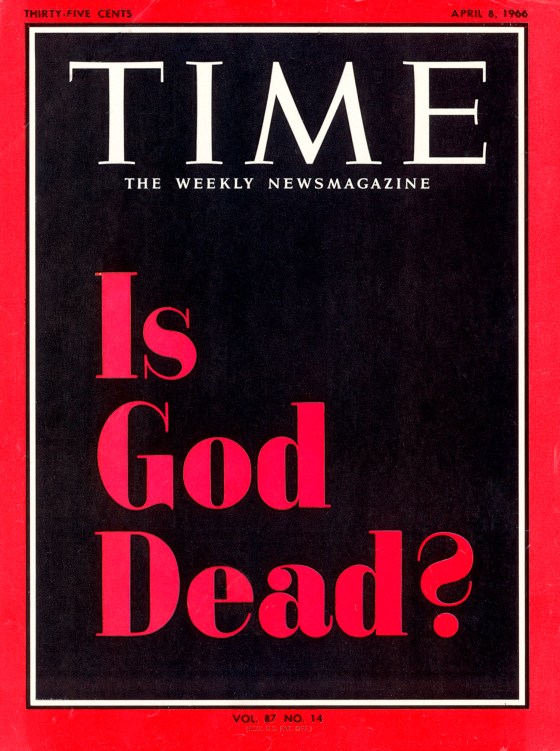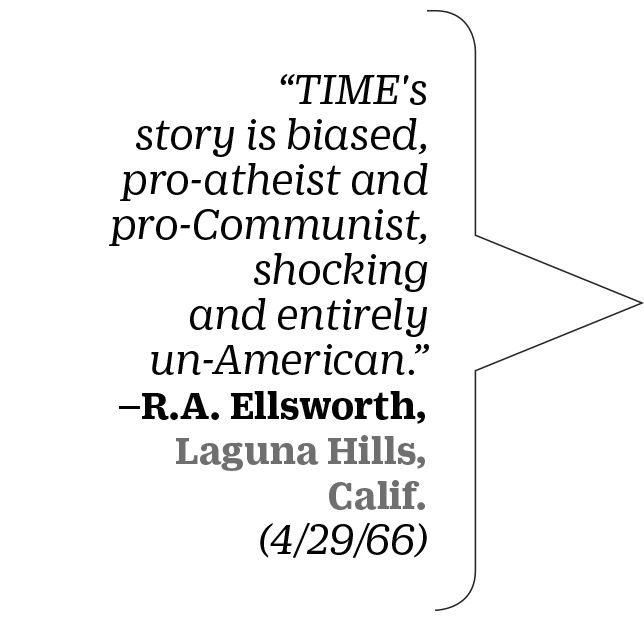Time Magazine Gets It Wrong Again Creationcom
The April 8, 1966, cover of Time launched a heated debate—and religious thinkers are still reckoning with the fallout

By Lily Rothman

Don Hamilton remembers the 24-hour interval well. This was dorsum in 1966. He was 12 when a classmate asked him the question: "Does your male parent think that God is dead?" Hamilton had to admit that the answer was yes.
Before long, some other friend's grandmother had started lobbying to have his father, William Hamilton, who was so a professor at Colgate Rochester Divinity School in Rochester, N.Y, fired. Rather than going to church, the family started doing Bible reading at home, on their own. Eventually, they left Rochester. There was no way to hide Hamilton's radical view after the April 8, 1966, cover of Time Mag asked the same question as immature Don'southward friend.
Is God Expressionless?
The story by TIME religion editor John Elson—and the gut-punch question on the cover, the magazine'southward get-go to include only text—inspired countless angry sermons and three,421 letters from readers. (For example: "Your ugly cover is a blasphemous outrage.") The National Review responded past asking whether TIME were, in fact, the dead one. Bob Dylan fifty-fifty criticized information technology in a 1978 interview with Playboy: "If you were God, how would yous similar to run across that written about yourself?" 50 years later, information technology remains i of the most iconic Fourth dimension covers ever produced.
Those three words that had stirred fence among a few radical theologians had suddenly captured the imaginations—and fears—of the nation. They likewise captured a moment in time. Thomas Altizer, another death-of-God theologian featured in the story, believes the same story today would take a far more muted reaction. "At least I can't imagine it," he tells TIME. "We are in a very unlike world."
The question had been brewing for a few years among Hamilton and Altizer and their colleagues, notably Paul van Buren and Gabriel Vahanian. (Hamilton and Vahanian both died in 2012; van Buren in 1998.) In 1966, Altizer and Hamilton published a volume of essays on the topic, Radical Theology and the Death of God, correct around when the Fourth dimension story came out.
The article was far more nuanced than the cover might suggest, but Hamilton and Altizer were not hedging in their views. Information technology's tempting to take them metaphorically, to say "decease" and mean "irrelevance," but they were speaking literally. The idea was not the aforementioned as disbelief: God was real and had existed, they said, but had get dead.

To Hamilton, the Expiry of God was largely an ethical problem. Jesus Christ was a better model than God for the work that needed to be done by man, of which there was a lot—peculiarly, for him, inside the civil rights motility. He saw religion's place in the human being realm, not in heaven. Altizer took that thought a footstep farther: Jesus Christ had to dice in order for the resurrection to happen all those Easters ago, and likewise God had to die in order for the apocalypse to take place. That'due south why, despite receiving death threats, he recalls being "ecstatic" during debates over TIME'due south embrace.
The civil rights movement was just 1 of many existent-earth events that made the question seem apt. In 1966, information technology wasn't so easy for Americans to believe that a beneficent God was actively steering the lives of man. Afterwards years spent battling evil abroad, American Christians watched as Godless communism drew its sinister mantle across the globe. And at home, with its one thousand thousand daily inhumanities, their own nation oppressed citizens due to the color of their peel.
"Every bit e'er, faith is something of an irrational spring in the dark, a gift of God," Fourth dimension explained back so. "And dissimilar in earlier centuries, there is no mode today for churches to threaten or compel men to face up that leap; after Dachau's mass sadism and Hiroshima's instant death, there are all too many real possibilities of hell on world."
Those "atrocities of the 20th century" weren't the only ingredients in the mix, says Peter Manseau, author of the new history of American spirituality One Nation, Under Gods. There was likewise news—whether of Muhammad Ali's joining the nation of Islam or of the War in Vietnam—that forced Americans to think nigh religions other than Christianity, and a counterculture that encouraged questioning assumptions.
Looking dorsum, there's another fact in the story that stands out even more than as an artifact of the time: survey results showed that 97% of Americans believed in God. The number of God's devotees has been shrinking ever since. In 2014, Pew found that merely 63% of Americans believed with absolute certainty. (Gallup numbers were roughly the same, if you include the "fairly certain" respondents likewise.)
Read more: "God Is Non Dead—But Our Power To Be Enlightened of God Might Be" -Sohaib N. Sultan
Among those concerned with the state of faith in America today, i of the most pressing topics is the "rise of the nones"—the increasing number of people who may identify equally spiritual, but claim no faith of their own.

And notwithstanding, fifty-fifty equally Americans belief in God declines, faith retains a powerful concur. Its presence is felt throughout politics, educational activity and pop culture. And the two sides of this story are not unconnected. Religion tin can no longer be assumed, goes one theory, and thus information technology doth protest.
"Nobody would ask whether God is expressionless [today]," says Rabbi Donniel Hartman, writer of the new book Putting God Second. "Yous can't sympathise 3-quarters of the conflicts in the earth unless yous recognize that God is a central player."
Read more: "God Will Never Dice" -Rabbi David Wolpe
An informal survey of theologians and monotheistic religious thinkers reveals a few major themes, each of which reflects the fashion the globe—and the otherworldly—has evolved over the course of fifty years.
The rising of pluralism and diverseness has forced American believers of different stripes to engage one some other. That means against a world full of other people who believe different things about what is supposed to be, in the case of the Abrahamic religions, ane God. This issue arose this year at Wheaton College, when a professor at the evangelical school was suspended afterwards stating that Muslims and Christians worship the same God.So the question might be something like, "Is that you, God?"
On the other hand, merely as Earth War Ii and civil rights were part of the death-of-God movement, the disconnect that has always hovered at the edges of faith—how can an omnipotent God exist in a world with then much misery and injustice?—continues to press religious thinkers to grapple with how to sustain faith while living a mortal life.
Finally, others encounter all that suffering and wonder not only why believers are not acting to stop it, but whether God is at error. That'due south a sentiment that William Hamilton himself hinted at in a 1985 interview, that maybe God didn't die but that "the wrong people have him and he should be killed."
Read more: Nobel Scientist: "I Identify My Religion in Human Gods" – James Watson
For some people, however, the question has never changed. There are radical theology Facebook groups; an admin of 1 of them, Christopher Rodkey, a 39-year-former United Church of Christ pastor in Dallastown, Penn., is putting together a 50th-anniversary edition of Hamilton and Altizer'due south 1966 book of essays. And Ross Hamilton, Don's older blood brother, believes there's still plenty involvement in his male parent's work to merit a documentary.
And Thomas Altizer is nonetheless hard at work.
When I caught the nearly-90-twelvemonth-old theologian by phone, he was in the middle of writing about death. His discipline matter has non changed, only the world has. Theology is relegated to the margins. Radical idea is less welcome. God, for amend or worse, is non up for fence. He notwithstanding proclaims his apocalyptic theories, but the ecstasy he felt in 1966 is gone.
"All the things that were crucial to me in the '60s are now gone," he says. "I'm non saying this is a bad time, just I recollect information technology'south a rather empty fourth dimension—empty of the joy that we once historic."
What Is the 'Is God Dead?' of 2016?
"Is the God that these people have just described the same ane I'g wondering nearly?" -James Hudnut-Beumler, president, the Association of Theological Schools
"Should Christians believe in a God who'due south a Christian?" -Justo González, writer of The Story of Christianity
"Who is God?" -Su'advertisement Abdul Khabeer, author of Muslim Cool
"Does God still believe in humans?" -Barbara Brown Taylor, author of Learning to Walk in the Dark
"Is Jesus necessary for salvation? One of my best friends is Jewish. Am I going to run across him in heaven? I call up the answer is yeah, but what does that mean for Jesus?" -Father Jim Martin, author of Jesus: A Pilgrimage
"Are we going to brand the sacrifices needed to insure that the Earth volition exist habitable for our kids?"-Rob Bong, author of What Nosotros Talk About When We Talk Near God
"How is the Blackness Lives Matter movement challenging religious communities to rethink their agreement of faithful responses to the inequalities and injustices of our day?" -Emilie Townes, Dean, Vanderbilt Divinity School
"Why are Americans in general, and especially American Christians, so indifferent to the deaths of others? Is the American censor dead?" -George Hunsinger, professor, Princeton Theological Seminary
"Should God be dead?" -Rabbi Donniel Hartman, author of Putting God 2d
"What skillful would information technology be for the life of the earth if God existed?" -Miroslav Volf, founding director, the Yale Heart for Faith & Civilization
To read the original article click here
Source: https://time.com/isgoddead/
Post a Comment for "Time Magazine Gets It Wrong Again Creationcom"